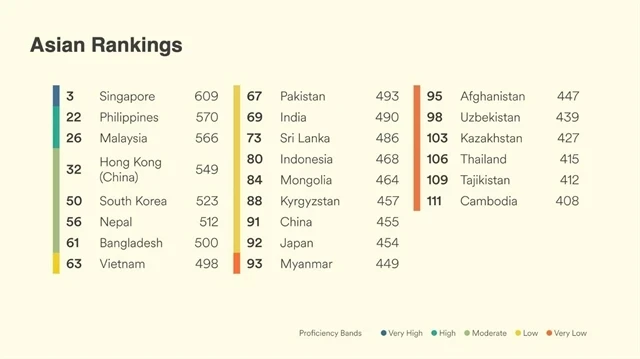Vietnam ranks 63rd out of 116 countries, regions in English proficiency
Vietnam ranks 63rd out of 116 countries and regions, and eighth in Asia in the 2024 edition of the EF English Proficiency Index (EF EPI).
EF EPI, the international survey of English skills by countries, capital cities and regions, published annually since 2011, has been released by EF Education First, a global provider of culturally immersive education.
For the sixth consecutive year, the Netherlands managed to retain the top spot, with Norway coming in second (from fifth in 2023), followed by Singapore, which moved from second to third.
Vietnam’s ranking in 2024 dropped by five spots compared to the previous year, falling from 58th to 63rd, giving its position to Guatemala, a Spanish-speaking country in Central America.
In the Asian region, Vietnam ranks eighth in English proficiency with a score of 498, following Singapore (609), the Philippines (570), Malaysia (566), Hong Kong (549), the Republic of Korea (523), Nepal (512), and Bangladesh (500).
The index, calculated from the test results of 2.1 million non-native English speakers, aged 18 and above in 116 countries and regions, reports an ongoing softening of worldwide English proficiency where men remain more proficient than women and young professionals more proficient than students and adults over 40.
“The global landscape of English proficiency is constantly evolving,” said EF EPI author Kate Bell.
“While the Middle East and Africa have improved this year, on the whole, we see a slow but persistent decline in the level of English among adults elsewhere. This trend supports the impression that in 2024, the expectation in many countries is that everyone speaks English, regardless of the reality, leading to a loss of focus on improving English proficiency in both the education system and the private sector,” Bell said.
The worldwide level of English proficiency has declined for a fourth year running, with 60% of countries in the index scoring somewhat lower this year than last year.
At present, large language models bring multiple benefits to English learners by providing limitless practice, explanation, and correction without social discomfort. Emerging tools will go even further, tailoring models for specific needs like speaking assessment to generate role-playing activities and present feedback in user friendly ways.
However, the superior performance of English-based AI services may further increase the value of English proficiency over time rather than decrease the need to learn English, since English speakers have access to far more powerful, reliable and varied AI assistance than others.
Mark Do, country manager of EF Education First in Vietnam, said: “We hope that this year’s EF English Proficiency Index may provide an objective perspective to guide strategic planning in English education and skill development for students and young professionals, especially in the context of the ongoing globalisation in Vietnam.”.






